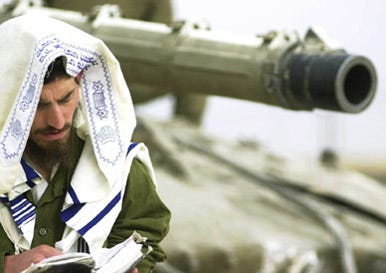But At What Cost?

Today I attended a shiur by a Dati-Leumi Rav on the topic of yeshivah students and army service. At one point he told a story about a friend who had lost a son in battle. This friend was particularly bothered by charedim who did not send their sons to serve, to the extent that at the shivah for his son, he didn't want any of them to come. Anyway, after the shivah, the Rav's friend asked him if anything could be done to encourage charedi yeshivah students to at least davven for the welfare of soldiers. "Perhaps if they were all to do so, boys like my son would not be killed!" he said.
And so the Rav went to the leading Rosh Yeshivah in the charedi world that he had a personal connection with, the late and great Rav Nosson Tzvi Finkel of the Mir yeshivah, a very fine and wise person. He asked Rav Nosson Tzvi if it could be arranged for some sort of tefillah to be said. And the answer was a firm no.
Rav Nosson Tzvi explained his reasoning. If the students of the Mir yeshivah davvened for the soldiers, they may come to respect and appreciate what the soldiers are doing. This in turn could lead them to join the army. And this could lead some of them to go off the derech. If that happened to even one student, said Rav Nosson Tzvi, he could never forgive himself. Therefore, he said, they should not davven for the soldiers.
The Dati-Leumi rav's response was that this does not reflect well on the charedi education system if its products are so fragile. But I don't think that that is such a strong or relevant criticism. Instead, I think that there are two other responses to be made.
First is that if one truly believes that those thousands of yeshivah students are doing something very valuable, then presumably one would also believe that the prayers of those thousands of Torah scholars are of great value. If so, then it would seem very selfish to deny those benefits for the welfare of soldiers merely because of the potential risks to the yeshivah students. (Indeed, it is for a similar reason that one cannot accept the argument that charedim don't go to the army because of the spiritual risks involved - it is selfish to insist that only others take risks because you don't want to.)
The second rejoinder to be made is as follows. Yes, by not praying for the welfare of those putting their lives on the line to protect us, you may have saved some of them from joining the army and dropping out of Judaism. But this has come at the cost of severely compromising the Judaism of all the yeshivah students, by educating them to lack basic hakaras hatov and Klal Yisrael consciousness. By trying to save Judaism, you have ended up tragically corrupting it.


